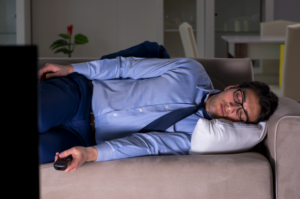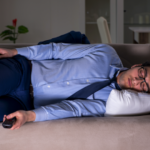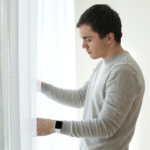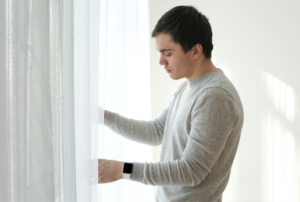 Many people leave the television on for noise as they go to sleep, but the question becomes, is this bad for our health?
Many people leave the television on for noise as they go to sleep, but the question becomes, is this bad for our health?
It’s a common practice and most don’t ever think twice about it. The problem is when your tv is left on, even quietly, in a room where you are trying to sleep it interrupts your ability to get to the level of REM (Rapid Eye Movement) sleep. This is the deep sleep where your brain and body are able to regenerate and heal.
The exposure to the blue high-frequency Calvin scale light readings that the RGB output of a tv screen produce is a nonnatural daylight effect which can mess with your circadian rhythms and natural ability to fall asleep and stay asleep. One recent study found that exposure to nonnatural light cycles may have other health consequences besides insomnia including increased risk for depression and anxiety.
The other issue with the tv playing while you are sleeping is that during sleep even though your mind is “turned off” and you are sleeping, your subconscious still hears and takes in everything. They don’t call TV “Programming” for nothing. Your subconscious is literally being programmed. While you may be perfectly able to monitor what you watch while awake, show after the show comes on without you being able to change the channel while you are snoozing. This leaves a wide window open for shows containing violence, anger, sadness, remorse, anxiety, loud startling noises that could actually wake you anyway. These emotions can carry over into your own life and feel like they belong to you when in reality its nothing more than “programming”.
Many that sleep with the TV on becoming dependent on it to go to sleep creating bad sleep habits. Try other bedtime behaviors such as meditation, reading, journaling, or simply clearing your mind. Try a sleep mask to block out all light, and earplugs to get rid of the sound. Sensory deprivation is great for sleep.
It may take some time but you might be happily surprised once you make the adjustment at how much more rested you feel when you wake up and just how easily you are able to drift off once you get used to it.
If you have problems relaxing enough to go to sleep try natural sleep aids such as lavender, valerian, vervain, or melatonin. All are sold over the counter at any health food store and many grocery stores as well.
www.drkasters.com can help you sleep naturally with regular chiropractic adjustments, dietary changes, and supplementation. Give them a call today to schedule 239-332-2555.


 Sleepwalking can be problematic for not only the sleepwalker themselves but for anyone living with them. Erratic night time behavior can leave the walker exhausted, never really getting a deep sleep and the person or people around them sleepless and on edge.
Sleepwalking can be problematic for not only the sleepwalker themselves but for anyone living with them. Erratic night time behavior can leave the walker exhausted, never really getting a deep sleep and the person or people around them sleepless and on edge.